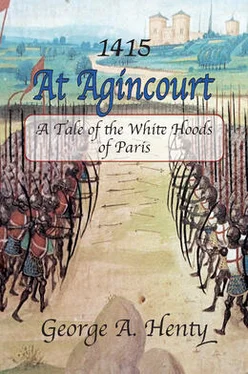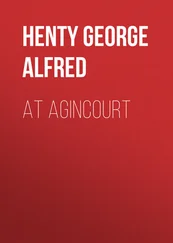“Thank God that you are safe, Master Guy! We have been grievously disturbed for your safety, for the count came here early this morning in disguise to ask if we had heard aught of you. He said that his daughter had returned last night saying that you had rescued her from the hands of the White Hoods, and that beyond the fact that they had followed you in hot pursuit she had no news of you, and that the countess was greatly alarmed as to your safety. The other three men-at-arms started at once to find out if aught could be learned of you. I would fain have gone also, but the count said that I must bide here in case you should come, and that there was trouble enough at present without my running the risk of being discovered. An hour since Robert Picard returned; he had been listening to the talk of the White Hoods, and had learned that one of their number had been killed and another sorely wounded by a man who had rescued a prisoner from the hands of a patrol. He had been chased by a number of them, and finally threw himself off the bridge into the Seine to avoid falling into their hands. The general idea was that he was one of the nobles in disguise, of whom they were in search, and that the capture would have been a very important one.
“All agreed that he could never have come up alive, for there were bands of men with torches along both banks, and no sign of him had been perceived. However, they are searching the river down, and hope to come upon his body either floating or cast ashore. Robert went out again to try and gather more news, leaving me well-nigh distraught here.”
“The story is true as far as it goes, Tom. I did catch one of them a back- handed blow just under his helmet as he ran past me, and I doubt not that it finished him; as to the other, I laid his cheek open. It was a hot pursuit, but I should have got away had it not been that a strong patrol came out through the gate at the other end of the bridge just as I was in the middle, and there was no course but to jump for it. I thrust my sword into the sheath, and went over. It added somewhat to my weight in the water, and it sunk my body below the surface, but with the aid of my hands paddling I floated so that only my nose and mouth were above the water; so that it is little wonder that they could not make me out. I landed on the other bank a quarter of a mile beyond the walls, slept in the forest, started this morning from Versailles, where I got rid of my other clothes and bought these. I purchased this basket and the vegetables at Sevres, then walked boldly in. No one could have seen my face in the darkness, and therefore I am safe from detection, perhaps safer than I was before.”
“Well done, Master Guy; they would have killed you assuredly if they had caught you.”
“It was not that that I was afraid of—it was of being taken prisoner. You see, if they had captured me and carried me before the butchers in order to inquire who I was before cutting my throat, they might have put me to the torture and forced me to say who I was, and where my mistress was in hiding. I hope if they had, that I should have stood out; but none can say what he will do when he has red-hot pincers taking bits out of his flesh, and his nails, perhaps, being torn out at the roots. So even if I could not have swam a stroke I should have jumped off the bridge.”
“You did well, Master Guy,” the archer said admiringly; “for indeed they say that the strongest man cannot hold out against these devilish tortures.”
At this moment a step was heard on the stairs, and Jules Varoy entered.
“The saints be praised!” he exclaimed as he recognized Guy. “I thought that you were drowned like a rat, Master Guy; and though Tom here told us that you could swim well, I never thought to see you again.”
Guy told him in a few words how he had escaped, and begged him to carry the news to his mistress. He was about to give him the address—for up till now he had refrained from doing so, telling them that it was from no doubt of their fidelity, but that if by any chance one of them fell into the hands of the White Hoods they might endeavour to wring from them the secret, and it was therefore best that they should not be burdened with it—but the man stopped him.
“The count told us that he would be at his booth at the fair at eleven o'clock, and that if any of us obtained any news we were to take it to him there. He said that there were several parties of White Hoods in the streets, and that as he went past he heard them say that the boy of whom they were in search was a messenger of some person of importance at court, and that doubtless the man who had rescued him was also in the plot, and that a strict watch was to be kept on the quarter both for the boy and for the man, who was said to be tall and young. Simon, who had been wounded by him, had declared that he knew him to be connected with the boy; that he was a young man with dark hair, and was in the habit of using disguises, sometimes wearing the dress of an apprentice, and at other times that of a butcher's assistant. He said that he was about twenty-three.”
Guy smiled. He understood that the butcher, who was a very powerful man, did not like to own that the man who had killed one of his comrades and had severely wounded himself was but a lad.
“As you go, Jules,” he said, “will you see Maitre Leroux and ask him if he can come hither, for I would consult him on the matter.”
CHAPTER XVI. THE ESCAPE
Maitre Leroux came in shortly after Jules Varoy had left. He had not, until the man told him, heard of the events of the night before, and Guy had to tell him all about it before anything else was said.
“It was a lucky escape, Master Aylmer, if one can call luck what is due to thought and quickness. Is there anything I can do for you?”
“This black hue that I gave my hair has been of good service to me hitherto, but as it is a youth with black hair that they are now looking for, I would fain change its hue again.”
“What dye did you use?”
“It was bought for me at a perfumer's in the Rue Cabot. As you see, it is fading now, and the ducking last night has greatly assisted to wash it out. The shopman said that it was used by court ladies and would last for a long time, but I have already had to renew it four or five times. I would now colour my hair a red or a reddish-brown; if I cannot do that I must crop it quite short. It matters nothing in this disguise whether it is altogether out of the fashion or not. What think you?”
“Doubtless you could get dyes of any shade at the perfumer's you speak of, for he supplies most of the court ladies with dyes and perfumes; and I should say that reddish-brown dye would suit you well, since that differs a good deal from your hair's original colour and still more from what it is at present. I will ask one of Lepelletiere's daughters to fetch it for you. It would be better than cutting it short, though that might not go badly with your present disguise, but should you need to adopt any other it would look strange, since in our days there is scarce anyone but wears his hair down to his shoulders. In the meantime I would have you wash your hair several times with a ley of potash, but not too strong, or it will damage it. I warrant me that will take out the dye altogether; but be sure that you wash it well in pure water afterwards, so as to get rid of the potash, for that might greatly affect the new dye. I will send a boy up with some potash to you at once, so that you may be ready to apply the dye as soon as you get it.”
Late in the afternoon Guy sallied out in the disguise in which he had arrived. His hair was a tawny brown. He had left his basket behind him, and carried a heavy cudgel in his hand. He sauntered quietly along, stopping often to stare at the goods on the stalls, and at nobles who rode past followed generally by two or three esquires. No one would doubt that he was a young countryman freshly arrived in Paris.
Читать дальше












